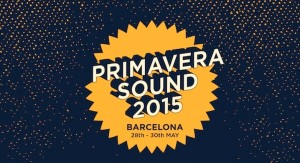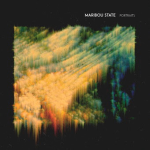 It would be unfair and somewhat hyperbolic to say that Primavera Sound – the Spanish festival that has become a staple of the European festival scene – is experiencing an identity crisis. However, even without considering all the extra-curricular activities held outside of Parc Del Forum, it felt like two festivals operating at the same time: on one side you had an expertly arranged group of stages that offered a wealth of choices from any musical genre you could imagine putting almost every other festival to shame; and on the other you had a behemoth area where the best position to watch your favourite band was available only at a premium, even if said positions were at times painfully under-subscribed.
It would be unfair and somewhat hyperbolic to say that Primavera Sound – the Spanish festival that has become a staple of the European festival scene – is experiencing an identity crisis. However, even without considering all the extra-curricular activities held outside of Parc Del Forum, it felt like two festivals operating at the same time: on one side you had an expertly arranged group of stages that offered a wealth of choices from any musical genre you could imagine putting almost every other festival to shame; and on the other you had a behemoth area where the best position to watch your favourite band was available only at a premium, even if said positions were at times painfully under-subscribed.
Ride performed in the latter area. They were ostensibly Primavera´s third annual attempt at ensuring the shoegaze genre remains on life support after Slowdive´s return in 2014 and My Bloody Valentine´s performance in 2013. It’s easy to assume that the Oxford quartet would have been more suitable as a headliner than the two fabled groups that preceded them: Ride’s music is more ‘anthemic’ and their link to lads’ favourites Oasis has ensured they have remained in the mainstream consciousness during their barren years. Alas, their set was a disappointment and never hit the heights of expectations awaiting their return.
The Replacements fared much better. With a reputation for performances that tight-rope walked over a pit of catastrophe even at the band’s peak three decades ago, even the most hardened fans had a sense of trepidation as the Minnesota alt-rockers took to the stage; but even considering ill-advised part-covers of The Jackson 5‘s ‘I Want You Back’, Barbie Gay‘s ‘My Boy Lollipop’ and Joy Division‘s ‘Love Will Tear Us Apart’ their set was an absolute phenomenon. Excluding these covers, the closing quartet of ‘Can’t Hardly Wait’, ‘Bastards Of Young’, ‘Left Of The Dial’ and ‘Alex Chilton’ contain more fist-raising hooks than could be found in the entirety of most band’s back catalogue. What makes it so special is that Paul Westenberg and co. seem to be having more fun than ever, and despite the trials and tribulations that have wrought the band’s existence they seem to have found a new peak.
But most of the weekend’s joys were to be found away from the aircraft hanger-sized clearing of the Heineken/Primavera stages. This started with the first act of the festival proper (ignoring the three days of pre-events) – Arthur Russell Instrumentals. Peter Gordon‘s presentation of the sadly-deceased composer/electro-pop pioneer/country singer/acclaimed cellist’s earliest works was a wonder to behold in the Auditori, backed by glorious technicolour visuals and performed with the joy it deserves. At its close Tim Burgess of The Charlatans joined the orchestra to perform one of Russell’s disco numbers. This should have been completely out of place after a (not necessarily traditional) ‘classical’ performance but such is the otherworldly unique identity of Arthur’s music that it fitted perfectly.
Swans‘ performance in the same room was the perfect representation of the dizzying depth and breadth of Primavera’s musical offerings. The Auditori, despite its pitch-black/blood-red décor and cavernous structure, felt like an inappropriate venue for the sextet’s blistering doom-rock’n’roll. The ringleader Michael Gira beckoned the crowd forward, many of whom ended up pressed against the edge of the stage or even on it in an effort to witness the continued efflorescence of one of the fiercest and most unmissable acts on the circuit for the last five years. Listening to the band whose sheer volume and unrelenting force makes them at the same time both utterly arresting and chillingly terrifying.
The same contradiction was also conjured up by German industrial forefathers Einstürzende Neubauten. They used more typical song structures and took advantage of respite much more often than their New York counterparts, but they certainly used it to their advantage as certain louder moments became muddied as sharp sea breezes raced across the ATP stage. Their use of unconventional and ingenious quasi-instruments (e.g. massive sheets of foil and a bucket full of building tools) to drive songs that are oddly catchy at heart won over new fans as well as obsessives; but in the end it was Blixa Bargeld‘s closing vocals on ‘Youme & Meyou’ that stopped the festival site dead in its tracks as he shifted four octaves from his typical Germanic croon to a blood-curling squeal. If such a tiny fragment of time could be the highlight of a festival then this would be it.
Not every performance was as confrontational. Antony & The Johnsons and Perfume Genius offered flamboyant and joyous interpretations of the best of their work, with the former showcasing new material backed by surreal high-art visuals that (perhaps wilfully) suggest – particularly on the stunning ‘4 Degrees’ – that she may finally be returning to the immortal heights of 2005’s I Am A Bird. In front of a crowd ranging from retirement age to those barely months old, Perfume Genius’ set felt like a coming of age show completing their slow transformation from lo-fi bedroom indie to mainstream pop.
One of the best things about Primavera is that the line-up is structured in a way that some of the crowd may not leave the Heineken/Primavara stage area. By midnight most of the audience know that their experience is improved the further down the rabbit hole you go. As such, two of the most impressive performances of the weekend took place on the smallest stage: one was Polish experimental black-metal group THAW and the other Australian shoegazers Flyying Colors, who undoubtedly have the festival’s highest ratio of crowd-surfers to crowd members.
However, the most impressive performance of Primavera took place outside the festival grounds, in the beautiful Parc Cituadella. The Hotelier have become known for making sing-along anthems out of subject matter that is difficult to read, never mind speak aloud. It is a testament to their raw energy and absolute dedication to their performance that they are greeted by a rousing chorus of the crowd at the ungodly hour (on Primavera Time) of 2pm on Saturday.
In truth, there is simply too much to cover without approaching a 5-digit word-count, but identity crisis or not whichever way you look at it Primavera Sound remains quite simply one of the best festivals in the world.




